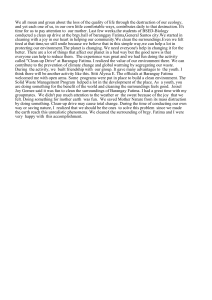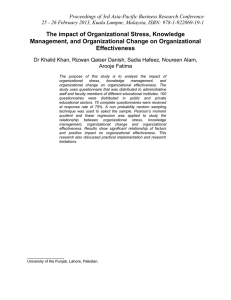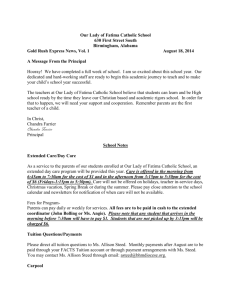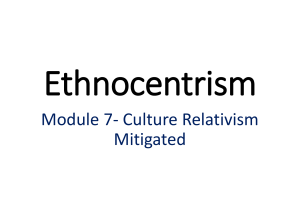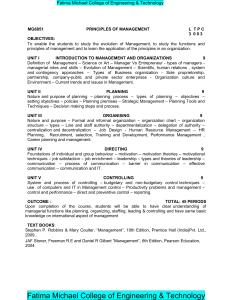WRITING ASSIGNMENT
advertisement
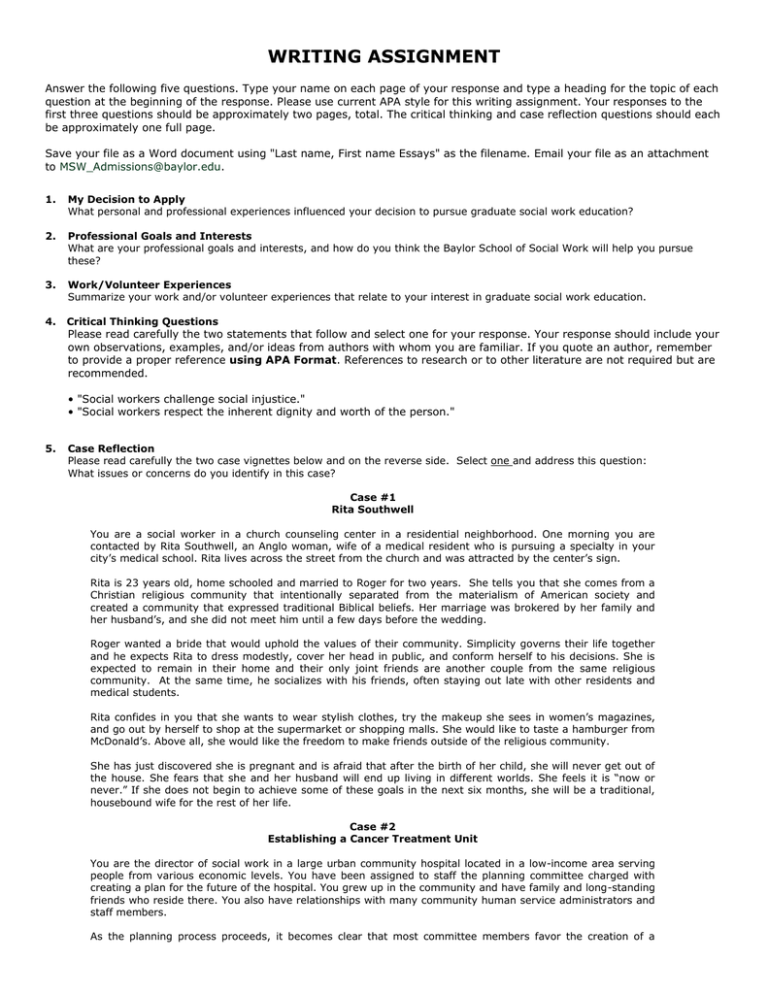
WRITING ASSIGNMENT Answer the following five questions. Type your name on each page of your response and type a heading for the topic of each question at the beginning of the response. Please use current APA style for this writing assignment. Your responses to the first three questions should be approximately two pages, total. The critical thinking and case reflection questions should each be approximately one full page. Save your file as a Word document using "Last name, First name Essays" as the filename. Email your file as an attachment to MSW_Admissions@baylor.edu. 1. My Decision to Apply What personal and professional experiences influenced your decision to pursue graduate social work education? 2. Professional Goals and Interests What are your professional goals and interests, and how do you think the Baylor School of Social Work will help you pursue these? 3. Work/Volunteer Experiences Summarize your work and/or volunteer experiences that relate to your interest in graduate social work education. 4. Critical Thinking Questions Please read carefully the two statements that follow and select one for your response. Your response should include your own observations, examples, and/or ideas from authors with whom you are familiar. If you quote an author, remember to provide a proper reference using APA Format. References to research or to other literature are not required but are recommended. • "Social workers challenge social injustice." • "Social workers respect the inherent dignity and worth of the person." 5. Case Reflection Please read carefully the two case vignettes below and on the reverse side. Select one and address this question: What issues or concerns do you identify in this case? Case #1 Rita Southwell You are a social worker in a church counseling center in a residential neighborhood. One morning you are contacted by Rita Southwell, an Anglo woman, wife of a medical resident who is pursuing a specialty in your city’s medical school. Rita lives across the street from the church and was attracted by the center’s sign. Rita is 23 years old, home schooled and married to Roger for two years. She tells you that she comes from a Christian religious community that intentionally separated from the materialism of American society and created a community that expressed traditional Biblical beliefs. Her marriage was brokered by her family and her husband’s, and she did not meet him until a few days before the wedding. Roger wanted a bride that would uphold the values of their community. Simplicity governs their life together and he expects Rita to dress modestly, cover her head in public, and conform herself to his decisions. She is expected to remain in their home and their only joint friends are another couple from the same religious community. At the same time, he socializes with his friends, often staying out late with other residents and medical students. Rita confides in you that she wants to wear stylish clothes, try the makeup she sees in women’s magazines, and go out by herself to shop at the supermarket or shopping malls. She would like to taste a hamburger from McDonald’s. Above all, she would like the freedom to make friends outside of the religious community. She has just discovered she is pregnant and is afraid that after the birth of her child, she will never get out of the house. She fears that she and her husband will end up living in different worlds. She feels it is “now or never.” If she does not begin to achieve some of these goals in the next six months, she will be a traditional, housebound wife for the rest of her life. Case #2 Establishing a Cancer Treatment Unit You are the director of social work in a large urban community hospital located in a low-income area serving people from various economic levels. You have been assigned to staff the planning committee charged with creating a plan for the future of the hospital. You grew up in the community and have family and long-standing friends who reside there. You also have relationships with many community human service administrators and staff members. As the planning process proceeds, it becomes clear that most committee members favor the creation of a specialized cancer treatment unit, which will gain status recognition for the hospital and also attract patients from throughout the state. But such a recommendation will make it impossible to recommend improvements for emergency and ambulatory care that are desperately needed by the neighborhood. A recommendation for a cancer treatment unit will change the nature of the available health care, who will get the jobs, use of community space, kinds of housing which will be available, and so forth. It becomes clear to you that the local community will gain very little and lose much if a cancer treatment unit is installed. You are torn between loyalties to the hospital, to the community in general, to the social and human service agencies in the community, and to the community’s population, including your friends and relatives who need a different type of service. Loewenberg, F. M., Dolgoff, R., and Harrington, D. (2000). Ethical Decisions for Social Work Practice, 235-236. Itasca, IL: F.E. Peacock. Used by permission. Page 9 2008/02/05 Case #3 Conflict with Family Traditions Fatima is the eldest daughter of a close family that upholds the conservative cultural and religious traditions of her community. She is the first woman in her family to have the opportunity to study at the university. Throughout her university experience, Fatima has realized that her family traditions are in conflict with the progressive and liberal lifestyle of her fellow students and professors. Her experience at the university has exposed her to new ideas that have created inner conflict. She has to make choices concerning her attire, social activities, and relationships with male friends. Fatima has difficulty integrating the new educational concepts she is learning with the traditional gender roles and expectations of her family. Her dream for the future is to become a teacher and live in the capital city. On a recent visit to her family in the small town where she was raised, Fatima’s father informed her that they has chosen a man for her to marry upon her graduation from the university. The expectation is that she will move in with the husband’s family and take on the traditional roles of carrying for the home, the ailing mother-in-law and future children they may have. The man they have chosen for Fatima to marry is ten years older than Fatima, a business man in the community, and is a religious leader. He will be able to provide will for Fatima and contribute to her family’s social and financial status. It is doubtful that he will allow Fatima to become a teacher and use the skills she has developed in her studies. Upon learning this information, Fatima has an emotional outburst and for the first time, disclosed to her family her dreams of pursing her career and choosing her spouse. The visit ended with all family members distraught and not knowing how to resolve this major conflict. Fatima has come to you as a social worker in a local community. She believes her family will respect your background, advice, and religious perspective. She also feels you are trustworthy and relatable confidant. She is at the point of making major life decisions and is requesting your input as well as your involvement in working through these problems with her family. You are aware of how important family life is to this culture. You are also aware of how Fatima is changing through her university experience.
